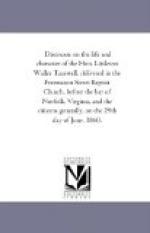But there was a young man, a member of the bar in 1802, whose elegant person, whose winning address, whose uncommon abilities, which were associated with industry and perseverance quite as uncommon, and whose glowing patriotism, would have made an impression in any country and in any age, and gained distinction in any sphere. Under such a portrait the name of one man only can be written—that of Robert Barraud Taylor. Young Taylor was eleven months older than Tazewell, was born in Smithfield, attended in Norfolk the school of that elegant scholar, the late Dr. Alexander Whitehead, became a student of William and Mary College, where he remained till his duel with John Randolph, in which he received a ball that he carried to his grave; studied law with Judge Marshall, and in 1796, at the age of twenty-two, engaged in the practice of the law in this city. His fine talents attracted universal attention, and business crowded upon him. His voice, action, eloquence, were all in fine harmony. As the district court system was then in operation, he had an opportunity of witnessing the displays of the leading counsel of the state in the neighboring town of Suffolk; and it was the dictate alike of interest and ambition to prepare himself for the conflict with his ablest contemporaries. Politics were the order of the day; and they soon engaged the attention of young Taylor. I heard many years ago, that when he came to the bar, and some time afterwards, he sided with his college mates Tazewell, Randolph, Cabell, Thompson, and James Barbour, and hailed with rapture the progress of the French revolution; but, shocked by the barbarities which disgraced the later stages of that moral and political maelstrom, and indignant at the unprecedented conduct of the diplomatic agents of France in our own country, he determined to separate from his early friends, and to uphold with all his influence the administration of Washington and that of his successor. It is said that he read with unmixed feelings of admiration and delight the Reflections of Burke on the French Revolution, which had appeared about six years before; and, if that work vanquished his early love of France, he may be said at least to have fallen by a noble hand. At such a crisis of foreign and domestic affairs, it was impossible that a young man with such powers of eloquence and such fearlessness of spirit should be allowed to remain at home, while all his old associates, and the oldest and ablest politicians of the state were about to assemble




